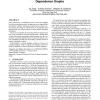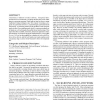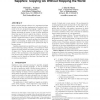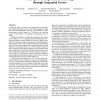225 search results - page 8 / 45 » From sequential programs to concurrent threads |
102
click to vote
LCTRTS
2004
Springer
15 years 7 months ago
2004
Springer
While concurrency in embedded systems is most often supplied by real-time operating systems, this approach can be unpredictable and difficult to debug. Synchronous concurrency, i...
121
click to vote
ICSE
2010
IEEE-ACM
15 years 6 months ago
2010
IEEE-ACM
Concurrency is inherent in today’s software. Unexpected interactions between concurrently executing threads often cause subtle bugs in concurrent programs. Such bugs are hard to...
143
click to vote
PLDI
2009
ACM
15 years 9 months ago
2009
ACM
Multicore designs have emerged as the mainstream design paradigm for the microprocessor industry. Unfortunately, providing multiple cores does not directly translate into performa...
140
click to vote
JAVA
2001
Springer
15 years 6 months ago
2001
Springer
Many concurrent garbage collection (GC) algorithms have been devised, but few have been implemented and evaluated, particularly for the Java programming language. Sapphire is an a...
155
click to vote
ASPLOS
2011
ACM
14 years 6 months ago
2011
ACM
Concurrency bugs are caused by non-deterministic interleavings between shared memory accesses. Their effects propagate through data and control dependences until they cause softwa...




